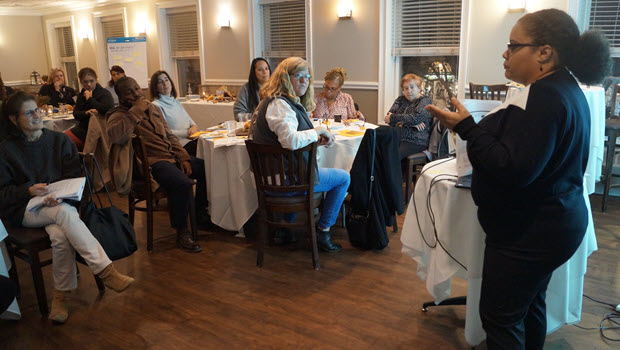No teacher wants to be on the receiving end of attacks about what is being taught in the classroom, but in the current political climate, it’s best to be prepared. That’s why NEA Professional Practice and Policy Teaching Fellow Faith Sweeney organized a Teacher Leaders for Equity Forum on teaching and free speech rights in December.
Sweeney, a Westport literacy coach, is currently serving as an NEA fellow during a year of absence from her school to support CEA and local unions’ diversity, equity, and inclusion agendas.
Sweeney told Fairfield and New Haven County teachers gathered at the Old Post Tavern in Fairfield that recent widespread attacks against educators have been spearheaded by far-right groups that have often provided funding behind the scenes to organizations with names like Moms for Liberty or Parents Defending Education.
While fears about critical race theory first made headlines, these groups have attacked schools’ use of many different terms and concepts–from culturally responsive teaching to social emotional learning to inclusivity.
“Lately groups have pivoted away from focusing on critical race theory and are now talking about parental rights,” Sweeney said.
She asked educators to reflect on topics they teach that could receive pushback from local groups and asked them to consider how they can be proactive.
Many teachers shared that they notify parents ahead of time when they plan to cover a topic that could be considered controversial by some.
“I try to get to know parents as much as I can,” Danbury bilingual and ESL teacher Luanelly Iglesias shared. “The more I know about them, the better the relationship I can have with my students and the more effective I can be when I have to follow up with them on any specific topic.”
“The number-one prevention piece is saying, ‘I always welcome input,’” said CEA President Kate Dias.
CEA Legal Counsel Melanie Kolek recommended that teachers set clear expectations with both students and parents up front at the beginning of the year.
She added that when it comes to parental complaints over what is taught in the classroom, parents’ rights seem to be outweighing not just districts’ positions on an issue but also teachers’ ability to make decisions for their own classrooms.
“In almost every single circuit court, we’ve seen decisions that give parents prerogative about what students learn,” she said.
Stratford Education Association President Michael Fiorello pointed out that parents have always had the right to opt their child out of reading certain books, but Kolek said the line keeps getting pushed, and books are being removed from classrooms out of concern that they’re causing disruption for other students.
CEA Vice President Joslyn DeLancey added, “This is why local elections matter. The stronger your board of education is, the less likely they are to succumb to something like book banning. It’s also important to have a strong relationship with your superintendent.”
Kolek said that strong relationships helped the local association in Stonington restore pride flags to classrooms after a parent complaint. The Stonington Education Association was even able to go beyond that and succeeded in getting a formal board resolution passed affirming support for LGBTQ+ students and staff.
“If an issue like that comes up in your local, have it codified,” Kolek said. “You can work with your association, board of education, and superintendent to come to an agreement on an issue.”
When is caution necessary?
Kolek told educators that there are notable limitations to their free speech rights as public employees.
For public employees’ speech to be protected, they must be speaking as citizens, not as employees, and must be speaking on matters of public concern. Even if the subject discussed is a matter of public concern, teachers’ rights to express themselves can still be outweighed by a district’s interest in the efficient operation of their schools, as speech that disrupts the workplace isn’t protected.
Therefore, on more controversial matters, CEA’s Legal Department recommends that local union leaders be the ones to speak out at, for example, board of education meetings.
Kolek said that most of the free speech issues she and CEA’s other legal experts become involved in occur when educators are upset and vent about a colleague or administrator, often on social media. It’s a different story when educators speak up, for example at a public hearing with legislators, sharing their own expertise and professional experiences as an educator.
Dias told teachers it is important to speak up when it comes to matters of public concern that affect their students and profession.
“Teachers must speak up and share their stories so that lawmakers know what is really going on in our schools,” she said. “Speaking up about an education issue that affects you and your students can be a very empowering and rewarding experience–one that can help bring about much-needed changes to the classroom and profession.”
Last year, teachers’ heartfelt stories, part of CEA’s What You Don’t See campaign, helped influence legislators to pass bills that included provisions banning dual teaching, requiring a 30-minute duty-free lunch, and providing more funding for mental health supports for students.
CEA’s legal team provides CEA members with free workshops examining the rights and responsibilities of teachers regarding a variety of legal issues. To bring a CEA legal workshop to your school or district, contact your local president.
To become involved with Teacher Leaders for Equity initiatives from CEA, plan to attend one or both of the events below.
- Tuesday, January 31, 5-7pm – Teacher Leaders for Equity Webinar: Advocating for What Teachers and Students Need and Deserve. Register today.
- Thursday, March 23 – Teacher Leaders for Equity Regional Forum: Teaching and Free Speech Rights. Holiday Inn, Norwich. Registration coming soon.







